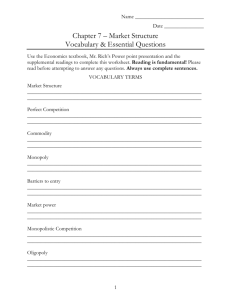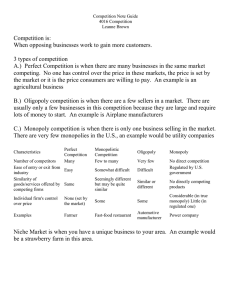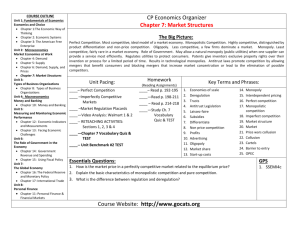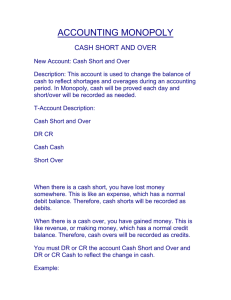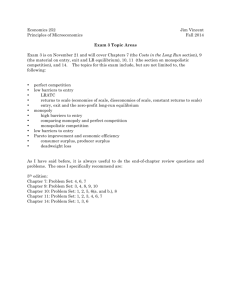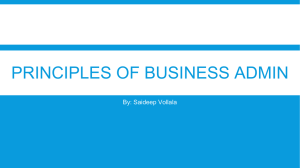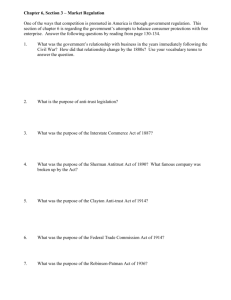No Competition No Consumer Interest: Regulation v.s. Deregulation Hu, Tzu-Shun
advertisement
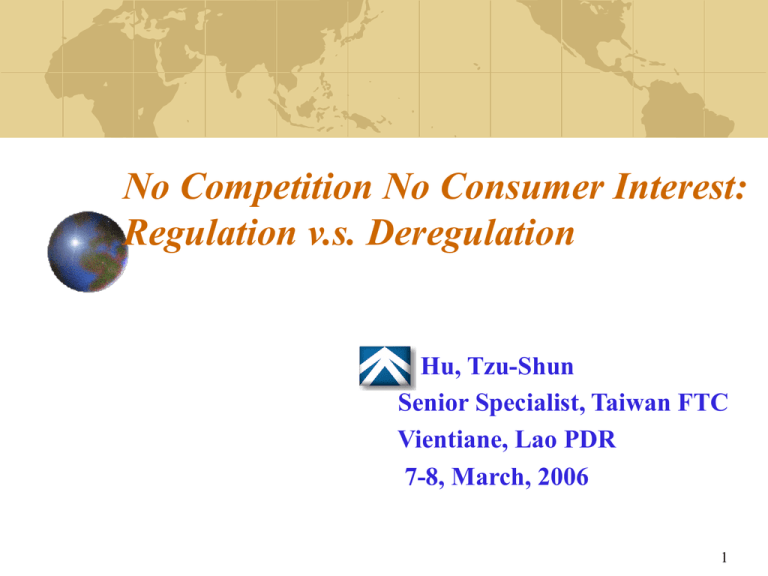
No Competition No Consumer Interest: Regulation v.s. Deregulation Hu, Tzu-Shun Senior Specialist, Taiwan FTC Vientiane, Lao PDR 7-8, March, 2006 1 2 economic regulation and competition are present in everyday life, even if we do not notice 3 A day in your life… • alarm clock in the morning the radio station that you listen was licenced by a regulator, and a bandwidth of spectrum has been given to it by the regulator • open the light electricity provided by a single company, the same every day; it has obligations and quality requirements to meet, imposed by regulation; 4 • Take a shower (hopefully) the water is provided by a single and the same company every day • Take your breakfast milk? but do you know how many brands are here? 5 • Coming to Office take a bus, prices and quality of service are regulated. Drive your own car, well, gasoline prices are regulated and the car must pay licence, and if take the highway, pay the regulated too, of course. • Call a Telephone no luck! Again regulated prices! 6 7 Give me answers , please. How do you feel their service, quality, quantity and price? * Is service better? * Is quality higher? * Is quantity enough? *Is price lower? 8 Improper regulation creates monopoly. Improper regulation creates corruption. 9 Monopoly P Income transfer Lost Consumer Surplus Deadweight Loss Pm A B C PC Because of the higher price, consumers lose A+B and producer gains A-C. AR Social welfare = Consumers’ surplus + producers’ surplus Social welfare = public interest MC MR Qm QC Quantity 10 The social costs of P monopoly are unfortunately often much higher than the P* DWL. Every producer has an incentive to establish a monopoly. He is willing to spend the monopoly profits (at least some of it) to bring him in that position. Rent seeking MC AR MR Q* Quantity 11 We need competition advocacy for enjoying good service, high quality, enough quantity and low price. 12 Purpose The aim of competition advocacy is to foster conditions that will lead to a more competitive market structure and business behavior without the direct intervention of the competition authority. That means to build a competition culture. 13 Policy in Taiwan 14 Article 46, FTL Where there is any other law governing the conducts of enterprises in respect of competition, such other law shall govern; provided that it does not conflict with the legislative purposes of this Law. 15 Deregulation Sectors Year Result Civil Aviation 1987 Before1987, only one internationalfreight company. Now, there are 6 companies. Bank 1991 Before 1991, no private banks in Taiwan. Now, most of banks are privates. Telecom 1994 Before 1994, only one state-owned Telecom company. Now, there are one public and four privates. Energy 2000 Gasoline --- 1 3 Power --- market open in generation 16 17 The ways to build a competition culture With respect to policy-makers * it has to do with the ways of dealing with the industries and the markets. * requirement of policy-makers to introduce competition factors into the policy. * should be a persistent habit of introducing competition factor into policy-making process. 18 With respect to business community * should be focused on the aspect of making business operators to comply with the competition law. * The way of making firms to comply with the competition rule could include : 1. law enforcement – leniency program 2. Educational activities – compliance program 19 With respect to consumers * Consumers need to know that they are responsible in acquiring fuller information about the choices available in the market to assist them in marketing wise consumption. * Consumers should know the fact that they are in a very good position to require the policy-makers to introduce more competition factors into the market. * Consumers need to be equipped with the competition culture so that they can spot the existence of irregularity of business activities and thus identify the existence of the violation of law. 20 The ways to build a competition culture Strengthening Public Awareness Improving Regulatory Environment Promoting Research on Competition Issues 21 Strengthening Public Awareness * To provide up-to-date enforcement information through the mass media * To brief to the press weekly the decisions of the Commission Meeting * To administer external liaison programs to enhance communication * To convene workshops * To conduct 72-hours lecture programs for managerial-level employees of firms 22 * To adopt business correction programs * To response to business self-compliance programs 23 Improving Regulatory Environment * Constantly advised and consulted with government agencies * Established a task force to investigate and examine all the existing other laws * Set up a deregulation task force to identify and remove unnecessary or undue regulatory control * Closely monitored the regulatory reform of public utilities 24 Promoting Research on Competition Issues * Commissions scholars and experts to research on developing issues * Publishes the academic journal Fair Trade Quarterly and awards scholarship to postgraduates * Holds liaison meetings periodically with the prosecutors and judges * Convenes international conferences regularly * Establishes the Competition Policy Information and Research Center 25 * Participates in international conferences overseas * Establish and maintain the APEC Competition Law and Policy Database * Conducts technical assistance programs 26 Deregulation is re-regulation Deregulation doesn't mean that we don’t need any controls or regulations. In fact, government should deregulate improper regulations actively and build rules of game which are transparent, fair and reasonable. 27

